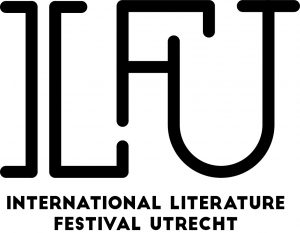 Good timing by the International Literature Festival Utrecht (ILFU) to put China at the centre of this year's edition. Just in time before the Chinese connected the Betuwelijn to their own railway network on their own initiative, with their familiar decisiveness. High time to get to know the Chinese soul, methinks, and that cannot be done directly through the numbers on the menu of the last remaining Chin.Ind.Rest. in your village.
Good timing by the International Literature Festival Utrecht (ILFU) to put China at the centre of this year's edition. Just in time before the Chinese connected the Betuwelijn to their own railway network on their own initiative, with their familiar decisiveness. High time to get to know the Chinese soul, methinks, and that cannot be done directly through the numbers on the menu of the last remaining Chin.Ind.Rest. in your village.
Although, then we have Sun Li not yet experienced. Sun Li conquered the Dutch literary world last year with a beautiful book about the Chinese restaurant in Friesland where she and her family grew up among the megawoks and flames to the ceiling. Even now, during a conversation with Kenneth van Zijl at ILFU, she talks about it beautifully.
[bol_product_links block_id=”bol_5916f9e8c896e_selected-products” products=”9200000057065409,9200000064461784″ name="ilfu" sub_id="sunli" link_color="003399″ subtitle_color="000000″ pricetype_color="000000″ price_color="CC3300″ deliverytime_color="009900″ background_color="FFFFFF" border_colour="D2D2D2″ width="590″ cols="2″ show_bol_logo="0″ show_price="1″ show_rating="1″ show_deliverytime="1″ link_target="1″ image_size="1″ admin_preview="1″]It is about silence and concealment. Because you don't talk about your own family and your own troubles. Typically Chinese, then, as did the other interlocutor Jean Kwok told.
Daily poverty
Kwok and Li are both immigrant children who have spent their lives mostly in the West. They are successful and have managed to escape their often poverty-stricken roots. Extra difficult because the Chinese community is as closed as an oyster. 'Our success is applauded by western readers, but it also obscures the view of daily poverty in the Chinese minority, including in the Netherlands.'
[bol_product_links block_id=”bol_5916fa1c90fd8_selected-products” products=”9200000026240380,9200000026240581″ name="ilfu" sub_id="kwok" link_color="003399″ subtitle_color="000000″ pricetype_color="000000″ price_color="CC3300″ deliverytime_color="009900″ background_color="FFFFFF" border_colour="D2D2D2″ width="590″ cols="2″ show_bol_logo="0″ show_price="1″ show_rating="1″ show_deliverytime="1″ link_target="1″ image_size="1″ admin_preview="1″]That the Chinese success story has a flip side is also beautifully demonstrated in the work of Xu Zechen. He is now world-renowned. The Netherlands can catch up now that his most recent book 'Running through Beijing' is available in our language. Zechen does not speak a word across the border, but why should you, with 2 billion linguistic peers. Partly for this reason, the interview with Daan Heerma van Voss was mainly a monologue, which, incidentally, was beautifully translated by interpreter Annelous Stiggelbout. A pleasure to listen to.
Young men
Xu Zechen writes about Beijing's underside. The Chinese capital appears to have a huge attraction especially for young men from all over China. They now form a 'people of ants' numbering in the millions: an anonymous mass of underprivileged people in which competition between them is fierce.
Such an awesome surplus of young men sounds like a loud ticking time bomb, but you won't hear such far-reaching reasoning from Xu Zechen. He did describe how the migration flow is driven by a folk song extolling the beauty of Tiananmen Square. And knowing that name from the last time that a young man surplus threatened Chinese tranquillity. But that association no longer exists in China, only with us, I notice.
[bol_product_links block_id=”bol_5916fa9d2389f_selected-products” products=”9200000052023853,9200000052033819″ name="ilfu" sub_id="xu" link_color="003399″ subtitle_color="000000″ pricetype_color="000000″ price_color="CC3300″ deliverytime_color="009900″ background_color="FFFFFF" border_colour="D2D2D2″ width="590″ cols="2″ show_bol_logo="0″ show_price="1″ show_rating="1″ show_deliverytime="1″ link_target="1″ image_size="1″ admin_preview="1″]Taboo
Not talking about things, but suggesting things without suggesting them. It sometimes seems that literature gains depth when there are more taboos in a society. After all, because of those taboos, you have to fall back on circumlocutions and imagery. From these encounters with Chinese authors, it appears that with those circumlocutions and imagery, one manages to create beautiful stories.
The impression the Chinese made on me overshadowed the other two highlights of this second ILFU evening. An entertaining interview with British novelist Graham Swift and the very exclusive interview plus mini-concert by Suzanne Vega. I only knew her from an old tape of '2-metre sessions'. She had not aged a bit, but now has a huge reputation as a writer and theatre-maker. Her interpretation of the life of Carson McCullers is convincing and delivers beautiful music.
[bol_product_links block_id=”bol_5916fb9156ef3_selected-products” products=”1000004003133203,9200000061672263″ name="ilfu" sub_id="vega" link_color="003399″ subtitle_color="000000″ pricetype_color="000000″ price_color="CC3300″ deliverytime_color="009900″ background_color="FFFFFF" border_colour="D2D2D2″ width="590″ cols="2″ show_bol_logo="0″ show_price="1″ show_rating="1″ show_deliverytime="1″ link_target="1″ image_size="1″ admin_preview="1″]In which a tiny festival can be very big. So.
Attended: ILFU day 2. Still to experience: Saturday 13 May. TivoliVredenburg Utrecht. Information and reservations: www.ilfu.nl
